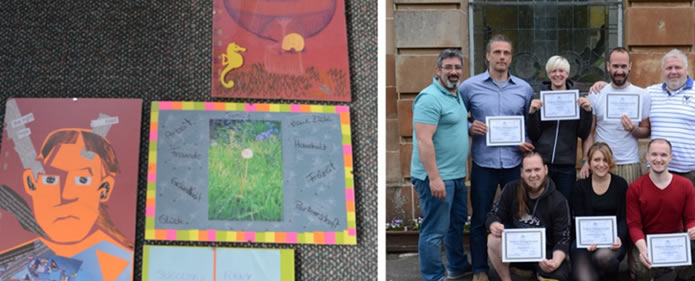
Helping young people at risk of social exclusion
The innovative Time for Change Europe project tackled some of the key challenges that young people in Europe are facing that affect their long-term future.
Led by Possibilities NI, the project was aimed at young people, developed in the UK and transferred across Europe during its lifetime.
This project addressed the needs of young people who are most at risk of being economically inactive, and more at risk of social exclusion, by involving those who were most severely disadvantaged.
The Time for Change Europe project used a unique blend of intensive one-to-one work groups and challenging outdoor activities to provide young participants with space away from their normal environments where they could start to consider the changes that they wanted to make to their lives.
The programme got me away from my situation; I got to talk one-to-one with my key worker, who supported me when I felt down, and that helped me to see there were other ways to go in life.
The organisation developed this programme to work with young people from very disadvantaged areas of Belfast, many of whom had experienced conflict and some had been at risk of paramilitary violence.
Other problems facing those who took part included family breakdown, severe poverty and problems with addictive or self-harming behaviours.
For example, one participant said: “Before the programme, my head was away with it. I had no confidence in myself and was paranoid and didn’t know how to change.
“The programme got me away from my situation; I got to talk one-to-one with my key worker, who supported me when I felt down, and that helped me to see there were other ways to go in life.”
Why is it 'Time for change'?
Young people who face particular social disadvantage are at even higher risk of not having access to or becoming removed from education, training, employment, and active society – an issue that is an international concern.
In 2019, European Commission figures showed more than 3.3 million young people aged 15-24 were unemployed in the EU. In addition, the 2019 unemployment rate among young people is recorded as less than 15%. However, this is more than double the overall unemployment rate for all age groups (recorded as less than 7%).
It is widely believed that the mobility of learners and youth is of paramount importance and even more so for those facing the most disadvantage and highest risk of social exclusion. In order to have access to mobility, however, young people must have the skills to enable them to undertake training, education or work experience.
Project aims
The Time for Change Europe initiative aimed to:
- create opportunities and address the needs of young people most at risk of becoming excluded from socio-economic activities;
- establish the basic core competencies needed to move into education, work or training; and
- directly address these issues by working with young people aged 16 – 25 who are most at risk or already defined in these categories.
As such, the project had strong links to the Europe 2020 Strategy, the Youth on the Move Agenda, and the European Youth Strategy whilst also ensuring that the most vulnerable young people didn’t get left behind or become further socially excluded by new programmes and initiatives.
“The programme challenged me to face my fears and motivated me to change,” one participant said.
“I make decisions that are good for me, to make me feel happy instead of down. I am drugs-free and feel good. My relationship with my family has improved. I have started to apply for jobs and think about the future; one of the goals I have set is to be happy and help others.”
Across Europe
The Time for Change Europe project transferred this innovative programme to Germany, Spain and Lithuania so that the project would ensure the needs of those who are furthest away from opportunity will be addressed. It aimed to ensure greater social equity and inclusion for young people across Europe while building an evidence base for this and similar youth programmes through research, piloting and evaluation of the project.
This project also enhanced the cooperation between youth organisations and organisation that work with young people in Europe by developing the international experience of young people, youth workers, and youth organisations in each of the partner countries.

Jonathon Giles, from Belfast Health and Social Care Trust, said: “Time for Change Europe has provided a much needed lifeline to many of the young people we work with. Their dedication and commitment has been outstanding and the working relationships forged have greatly enhanced the service provision and indeed the outcomes for young people.”
The project partnership encouraged synergies in working across several fields while maintaining a strong focus on youth. The aim was to facilitate action at all levels and to utilise each partner’s unique skills and experiences to ensure the project was delivered and sustained to its full potential, giving partners the opportunity to build capacity and to share knowledge and good practice.
For young people who have lost contact with or trust in mainstream services, Time for Change Europe aimed to serve as a first step back. It was designed to be suitable for partners to use with their most vulnerable clients, helping to draw them into other training, education and employment support services and programmes.
Inspired by Possibilities NI's work? Apply for Youth funding now!
